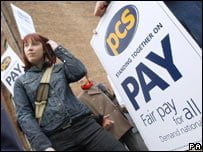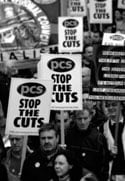The
Annual Delegate Conference of the public sector union PCS took place
on 20-22 May in Brighton against the background of the worst global
recession for a generation and an unprecedented political crisis at
Westminster.
The
parliamentary expenses scandal continues to unfold and, as we write,
there is a very real threat of BNP racists winning seats in the
European Parliament. The anti-public sector onslaught continues with
civil servants in the firing line against mass job losses in the
private sector. This was reflected at conference in the motions and
debates heard which were the most overtly political for many a year –
and the Socialist Appeal magazine selling like hot-cakes as people
search for answers to the crisis.
Being
a union member and becoming active in your union has never been more
important and Conference – elected by the membership – sets the
campaigning and organising agenda for the union in the coming year.
This includes the way forward on jobs, pay and public services,
equality, pensions, health, safety and welfare, international issues
and the structure and rules of the union.
‘Lack
of progress’
Amongst
these was an emergency motion on pay moved by the national executive
committee. The motion set out the position that PCS now finds itself
in across the civil service and linked bodies. It noted the delay
from government in publishing the Pay Remit, its inflexibility and
the refusal of departments to convert cash from efficiencies into
members’ pay packets in respect of the ‘agreement’ reached on
the back of aborted industrial action at the end of last year. The
motion, which was carried overwhelmingly, went on to reaffirm PCS’
position on pay, which included a 6 % pay claim and committed the
union to widespread consultation with members.
Representatives
will discuss the way forward with members in the coming weeks and
months. Ultimately PCS members will decide what and how much action
they are willing to take. The union must provide a clear lead,
building confidence in members’ abilities to fight back and win.
This includes working with other unions which strengthen our case.
Socialist
Appeal supports the left-led leadership and we supported this motion
but in a leaflet, advertising our fringe meeting, handed out to
delegates, we explained that while we believe the NEC was right to
suspend the national pay strike last year to enter into negotiations
with the employer, the talks did not achieve enough. We opposed the
NEC’s decision to call off the strikes, following the ‘agreement
‘ reached with the government.
We
believe that our position has been vindicated. Clearly the agreement
is not worth anything and this is now being demonstrated. Pay
negotiators are finding that there is no extra money on the table –
which was the main plank in the agreement. This was not just the
power of hindsight as the General Secretary mentioned in his speech
but was on the basis of our analysis at the time (See previous
article here ).
We
should not pay for this crisis
 Conference
Conference
was under no illusion as to the scale of the task that our union
faces in the next period. This was reflected in the bulk of the
agenda not least in the ‘Social and Economic Recession’
debate. It was widely felt that workers were being expected to at the
very least "share the pain" inflicted by the recession, having
not shared any of the gains of the ‘good times’!
There
were a number of motions addressing the economic crisis and proposing
a political solution which were overwhelmingly carried. These put
forward a programme directly challenging the social, economic and
political system calling for extensive nationalisation, increasing
tax on corporations, council house building, an end to war, repeal of
the anti-trade union laws and ending privatisation and use of
consultants in the public sector, and committed the union to fighting
for this programme. It will be down to rank and file activists and
the members to ensure this fight is carried out starting in the
workplace.
Progressive
PCS
conference reaffirmed its progressive nature as a union by passing
motions against oppression of the Palestinians by the Israeli state
and the use of ‘rendition’ to deport asylum seekers. Conference
also agreed to back the United Campaign Against Police Violence. This
followed the tragic death of Ian Tomlinson at the hands of police at
the G20 protests in London in April. Conference heard how there was a
wealth of evidence that the police force had employed unwarranted
aggression and tactics against peaceful protesters (See previous
article here )
Fighting
traditions
Conference
also pledged its report to Rob Williams who had been unfairly sacked
for trade union activities at the Linamar (previously Ford then
Visteon) car plant in Swansea. This sparked an unofficial walkout of
his workmates. Rob had been a vociferous campaigner for former
colleagues in the Visteon car-plants Rob visited the conference and
received a standing ovation from delegates.
A
good school for all
I
called for PCS to affiliate to the Anti-Academies Alliance in the
affiliations debate on behalf of my branch. There is concern in the
trade union movement and amongst parents and teachers that the
involvement of business people in state schools is undermining
democratic control over the curriculum, driving down pay terms and
conditions for staff and may end up costing more. There have been a
number of strikes by teachers. In my speech I referred to a strike at
two schools that week in Essex over terms and conditions.
General
Secretary
 Mark
Mark
Serwotka remains one of the best trade union leaders and his
intention, announced at conference to stand in this year’s General
Secretary election will be welcomed by most PCS members and indeed by
many rank and file trade unionists across the movement. If Mark is
returned by PCS members then PCS will continue to fight tooth and
nail in the interests of its members.
Independence
Conference
sought to take PCS into uncharted territory in light of it’s
historically ‘apolitical’ stance when, while reaffirming that PCS
would not be seeking affiliation to any political party, a motion was
passed committing the union to a widespread consultation on the
question of supporting ‘trade union candidates’ and ‘PCS
candidates’ in elections. It was made clear that any proposals
coming out of the consultation would be put to the members in a
ballot. There has never been a more important time for trade
unionists and workers in general to discuss, debate and fight for
political representation. The question is where will the debate lead
and what can we achieve?
It
is obvious that there is immense disappointment from the millions of
Labour voters who have stayed at home during the elections since the
Labour landslide in 1997. And there is immense frustration amongst
the active layers of the working class who face a daily battle
against job cuts, privatisation and the wage erosion of pay and terms
and conditions. Many are correctly drawing the conclusions that it is
the system that is at fault and that the bosses are to blame. Most
are rightly angry at the Labour government who have presided over
more privatisations than the Thatcher and Major governments combined.
General election
With
a historically low level of trade union action (indeed PCS has taken
more official strike action in recent years than any other union)
trade union leaderships have in the main been rendered complicit in
the New Labour agenda. The Tories, the ruling class’s natural party
of government, has been able to rebuild and regroup. From a position
where bourgeois commentators had questioned whether they could ever
recover they now look as though they will come to power in the coming
General Election.
Socialist
Appeal believes that though this may be likely it will be largely due
to abstentions across the working class – rather than the Tories
winning it will be Labour who lose, as a result of the right-wing
policies the government it has slavishly followed since 1997.
History
shows that it is inevitable that at some point the working class
having been defeated on the political plane will turn towards the
industrial front. We will resort to industrial action on a scale that
directly challenges the political establishment. The election of a
Tory government makes this all the more likely. And such a movement
will without a doubt be reflected in the Labour Party. Trade
unionists and Marxists cannot afford to stand on the outside.
However,
if it is decided to stand PCS supported candidates in elections this
will not prove to be the way forward. What is needed is for the
trade union movement alongside rank and file members to build a
movement to take control of the Labour Party and commit it to
socialist policies in the interests of ordinary people. Such a
programme would not only win back for Labour the millions of lost
votes but would restore the faith of public sector workers in a
Labour government. PCS should play their part in this struggle.
‘A
New Politics’
 John
John
McDonnell MP, Chair of PCS Parliamentary Group and President of Hands
Off Venezuela, was introduced to conference by Mark Serwotka as the
most "outstanding parliamentarian of a generation." John has been
an unstinting supporter of the trade unions and not least PCS,
raising questions on Parliament on our behalf, standing on our picket
lines and speaking out against the sleaze and corruption of those
that surround him in the House.John
said the political crisis caused by the expenses scandal and the
economic crisis were "two sides of the same corrupt system." He
said people were angry but that we need to channel that anger into
demanding changes.
In
a radical speech, John stated that, "it may need direct action. If
parliament fails to give us a choice, we have to relocate it. It’s
time for us to seize the moment to change." John called for
parliament to be relocated to the picket lines and the street. This
is where the working class will challenge the system and begin the
struggle to overthrow and replace it. Socialist Appeal backs this
rallying cry.






